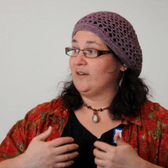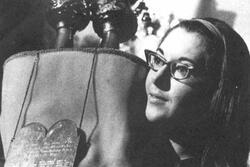Loving the Stranger Within
In this sixth piece from our Reimagining 'Rabbi' series, Rabbi Minna Bromberg responds to this clip from our Women Rabbis Exhibit:
Even now, I find myself having trouble writing this post. Even now, after giving up dieting over 25 years ago, after writing songs about loving my bathing-suited body exactly the way it is, after years of asking doctors to treat me using the evidence of blood tests and blood pressure cuffs instead of only the numbers on the scale, after previous––largely positive––experiences writing on Torah and fat activism, there is still something in me that wishes I could somehow slip away from, or obscure, this stigmatized aspect of myself: my fatness.
It is no wonder that I resonated so deeply with Rabbi Tina Grimberg’s heartbreaking honesty in sharing how, growing up in the Soviet Union, she wished that she could get rid of her Jewishness. Anti-Semitism meant that “everything was more difficult,” from going to university to getting a job. But this difficulty was compounded by the ways that “ignorance and shame of what it meant to be a Jew” worked their way into her. With “no Jewish knowledge to build your pride upon,” the anti-Semitism around her faced no real opposition as it crept inside her: “If I could have gotten rid of that Jewish part of me and stamped it out, I would have.
I get it, how this feeling of “othering” could cozy itself up under the welcoming roofs of our own skulls. As a smart, fat, Jewish girl––and the only such creature in my small town––I often felt that there just wasn’t a place for me. And fatness was by far the worst of these differences: I was sure, as early as age seven, that if I could only lose weight I would not be nearly so lonely. I enthusiastically swallowed whole the fat-shaming that pervades our society. I believed the messages around me; being fat meant that I was lazy, weak, and ugly.
Grimberg says that she wanted to stamp out her Jewishness despite the fact that she grew up in “a warm Jewish household.” I too grew up in a loving home but it wasn’t enough to insulate me from the sense that being fat meant I wasn’t worthy of basic acceptance and belonging. Absent the resources to build something meaningful of a perceived “flaw”, who wouldn’t want to escape to some other self that was free of the “flaw” of fatness, or of Jewishness?
It seems somewhat miraculous to me that while my Jewishness made me feel marginalized as a child, my Judaism offered wisdom on how to deal with othering. Namely, it commanded love. As a very serious twelve-year-old, I preached at my bat mitzvah about the importance of loving the stranger because we were strangers in the land of Egypt. This mitzvah spoke to me deeply as a child and I have no doubt that my own sense of myself as “other” and “strange” heightened my awareness of others around me who might be feeling the same way. And though I couldn’t quite access it at the time, I know that once I was ready to accept my own differences, my own stranger-hood, this teaching would buoy me immensely. If we are meant to love the stranger then surely the stranger is meant to be loved––the stranger without, but also the stranger within.
Commandments to love the stranger and not to oppress the stranger are repeated over and over in our Torah–– so often that the Talmud itself seems to lose track, saying that we are warned about this “in 36 places and some say in 46 places” (Bava Metzia 59b). As I sit here struggling to write, I know that this repetition is necessary, because so long as I live in a society where fatness is othered, I will need reminding and reinforcement to face down the urge within me to rid myself of myself––I will need reminding to meet oppression with a greater love.
Loving the stranger, and loving our whole selves, is a lifelong practice. The downside of this is that the work is never done. The upside is that the work is always possible. Even in moments (or decades, or presidential administrations) when we feel limited in our ability to change the society around us, we can still practice loving the stigmatized aspects of ourselves instead of colluding with those who would stamp them out.
I’m proud of my twelve-year-old self, standing up there on the bima teaching the congregation about the importance of loving the stranger. I feel blessed that this lifelong practice of also loving the stranger within has become such a central part of my own rabbinate ––as a fat feminist, as a woman rabbi who lives in Israel, and as a voice teacher whose students often arrive wishing that they could exchange the only voice they have for some imagined better one. And I’m grateful to Rabbi Grimberg for her example of persevering until she found what was beautiful and worthy in her Jewish identity.
Love Rabbi Bromberg's reflection? Want to stay up to date on our weekly Reimagining ‘Rabbi’ series? Let us know!








This is a truly beautiful story and testimonial. Thank you for sharing your vulnerability and strength, Reb Minna! fondly, Reb Rosalind Glazer